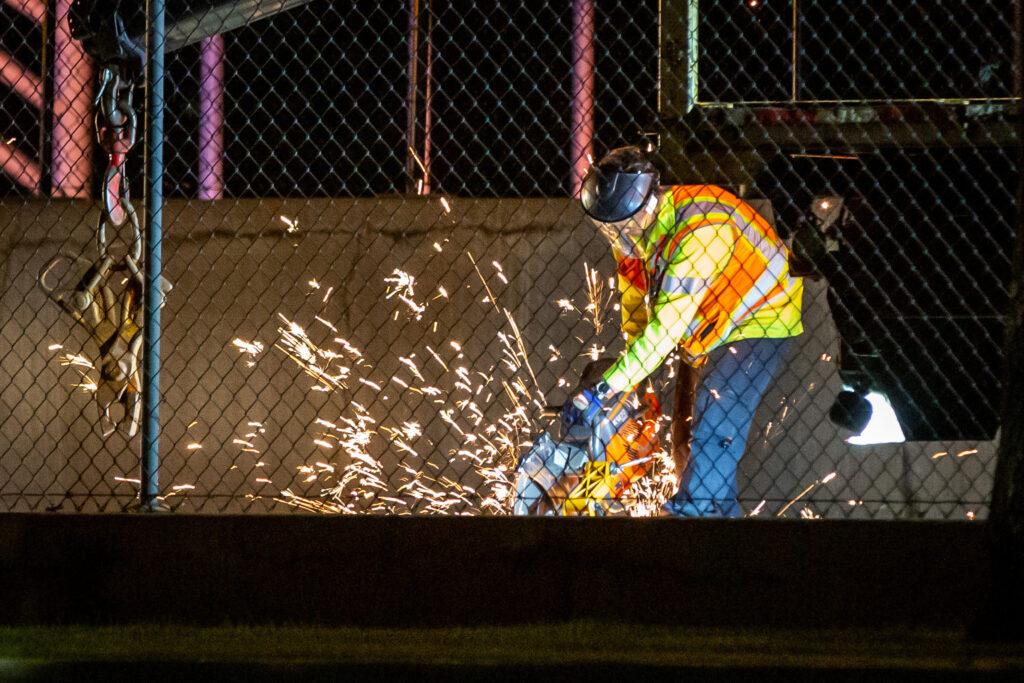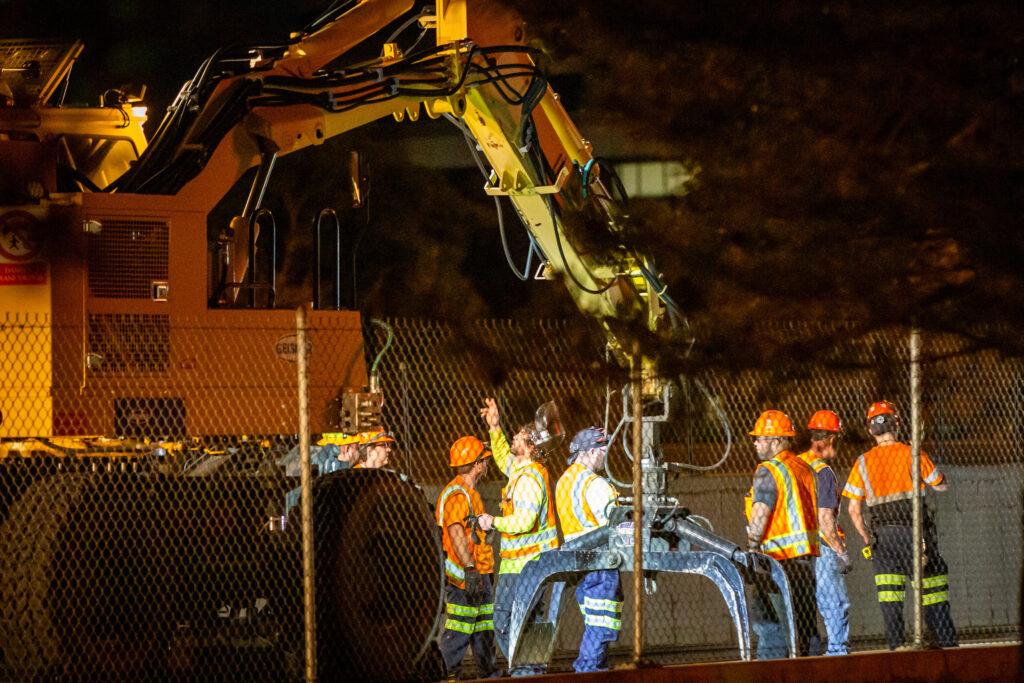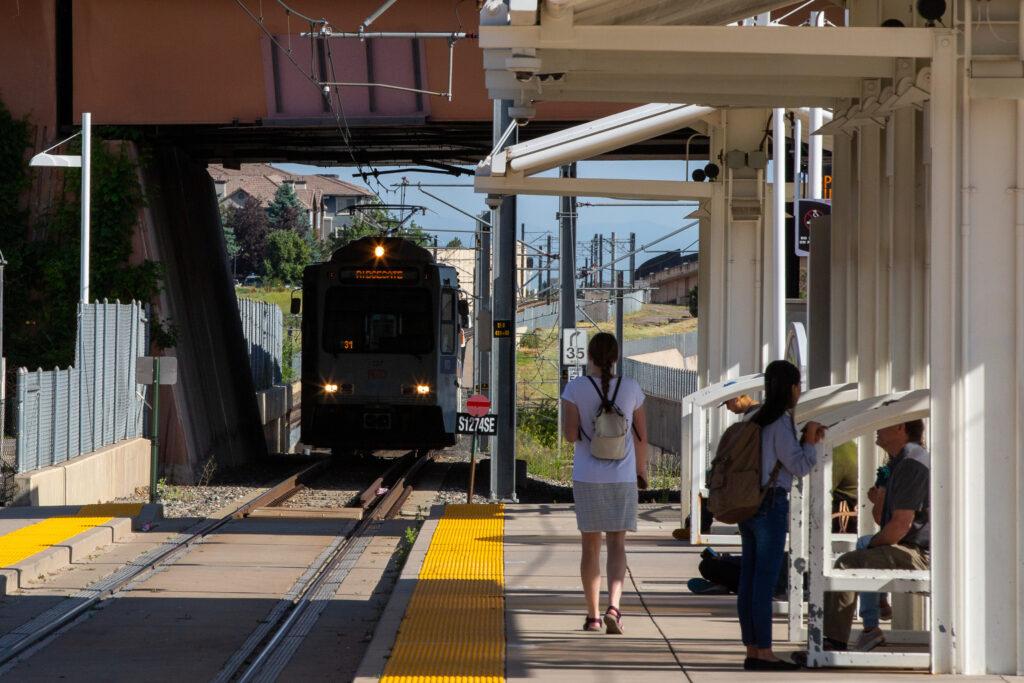
Regional Transportation District officials say they’re making progress fixing track problems that have slowed light rail trains on southern sections of the E, H and R Line.
All speed restrictions between the Orchard and Belleview stations have been lifted, RTD announced Tuesday. Officials added that they hope all trouble spots will be fixed by September if all goes well.
But that still leaves miles of track where trains are still traveling at just 10 mph. Between the pokey trains and another disruptive repair project, commuters say using the E Line in particular — which runs just once an hour and is often late — is now nearly impossible.
Some of those frustrated passengers and transit advocates told RTD brass at its Tuesday board meeting they wanted immediate fixes like more bus alternatives and better communication about last-minute disruptions.
But many of the more than half-dozen riders who addressed the RTD board and executives also demanded accountability for deeper issues. They told board members to pressure RTD management to shake up a “culture of secrecy” and push for more information on the root causes behind the slowdowns.
“One thing that is painfully clear to the public, but does not appear to be clear to everyone in this room is the simple fact that RTD is failing in its responsibilities to provide workable service,” said James Flattum, co-founder of the transit advocacy group Greater Denver Transit.
RTD brass said they heard the criticism and apologized.
“I, as chair of the RTD board, am sorry for the delays and disruptions,” board chair Erik Davidson said.
Davidson, like RTD officials, has for the last few weeks since the “rail burn” track issues first took operators and passengers by surprise in early June, said the slow zones and track fixes are the result of stepped-up inspections and new, more rigorous and proactive maintenance standards.
He also admitted that RTD should have been more proactive in communicating problems and a timeline for repairs. RTD is now updating a webpage daily with the latest progress on the track repairs and is working to improve its rider alert and online trip-planning systems.

Debra Johnson, RTD’s CEO and general manager, has worked for transit agencies in cities including Washington, D.C., and San Francisco, that have older rail systems. Riders in those cities are used to maintenance disruptions, she said in an interview with CPR News, and riders in the Denver metro will have to get used to them, too.
“While I don't enjoy having service interruptions, this is the nature of the beast,” she said, adding: “What we're trying to do is establish a program whereby we can minimize those impacts.”
RTD’s light rail system does have shortcomings that will likely make repairs more painful, too. A previous generation of RTD leaders cut corners to keep costs down so they could finish all the projects they’d promised voters.
One example Johnson mentioned: Some repairs require all train cars to be removed from the tracks so that overhead wires can be powered down. But because RTD has just one yard where train cars can be stored, it takes more than an hour to get them all there every night. That limits how long crews have to do track work, which means repair jobs take longer.
“There's a lot of things that we did — woulda, coulda, shoulda,” Johnson said at a separate board meeting earlier this week.
RTD’s light rail safety regulator, the Colorado Public Utilities Commission, recently criticized the transit agency for not catching maintenance issues before they disrupted service so much. Johnson pushed back on that criticism, telling her board this week she was “taken aback” by it.
Some board members have pressured RTD’s leaders publicly. Some haven’t
Board member Jaime Lewis, who slammed executives in recent weeks over the slow zones and lack of backup buses, said communication has improved and that he’s impressed with RTD’s commitment to safety.
But he gave the ongoing impact to riders an ‘F’ grade.
“I just don't understand how we can leave the riders out there,” he told RTD executives at a Monday board meeting. “We just abandoned them.”

Another board member, JoyAnn Ruscha, said she wants executives to prepare for the possibility that track inspections will turn up issues on other lines, like the D and R, and torpedo schedules.
“I don't feel comfortable that we have a plan,” she said.
Other board members were less critical. One, Michael Guzman of Denver, said passengers and board members need to be patient — both for answers and, literally, for the trains themselves.
“It's a great opportunity to use 30 or 40 minutes to read through that book you've been meaning to get through or listen to that podcast that you want to get through,” he said, adding: “The work must be done. It is not optional.”
Other RTD updates: TABOR ballot measure, Central Park development, and just how long is Debra Johnson going to stick around?
The board of directors on Tuesday also gave its approval to a ballot question that will ask voters in November to allow it to indefinitely exempt its entire budget from revenue limits in the Taxpayer’s Bill of Rights.
The board also voted to advance negotiations with an affordable housing developer that wants to build 800-plus apartments units on part of RTD’s underused Central Park Park and Ride.

And a new RTD-commissioned organizational self-assessment report that sums up concerns from more than 300 employees shows executives have plenty of internal issues to work on, from a lack of faith in the integrity of senior leaders to workers’ disappointment over RTD leaving its empire-building phase and moving firmly into maintenance phase.
Another big concern buried on page 41 of the report shows that workers have confidence in Johnson herself — and that they are worried about “rumors of her likely departure.”
So does Johnson have plans to leave?
“Am I actively seeking employment right now? No. Do I know what tomorrow will bring? That answer would be no,” she told CPR News.
She also noted that most transit agency CEOs sign three- to five-year contracts. Johnson signed her five-year contract in late 2020.
“We'll see what shakes out,” she said.









